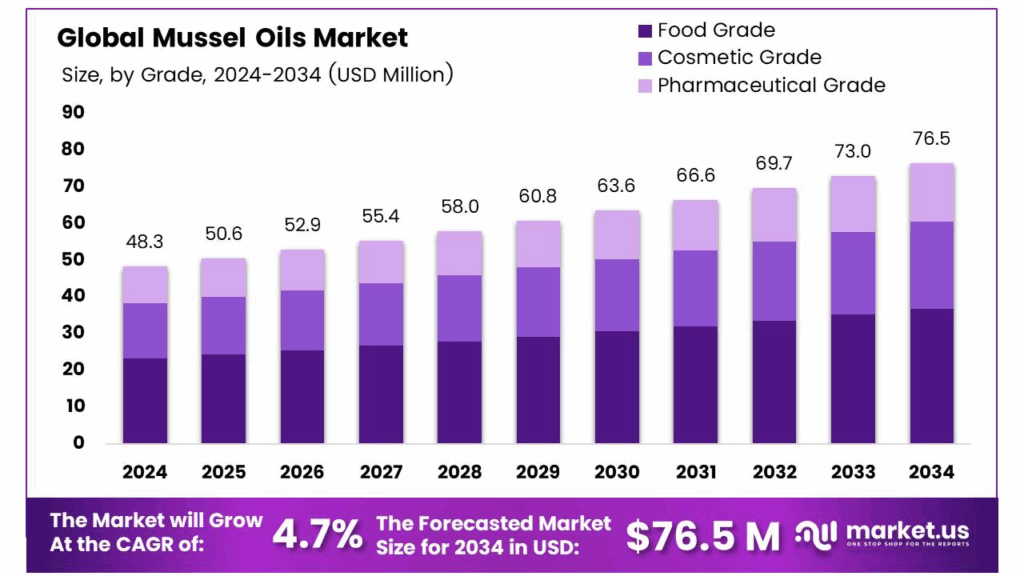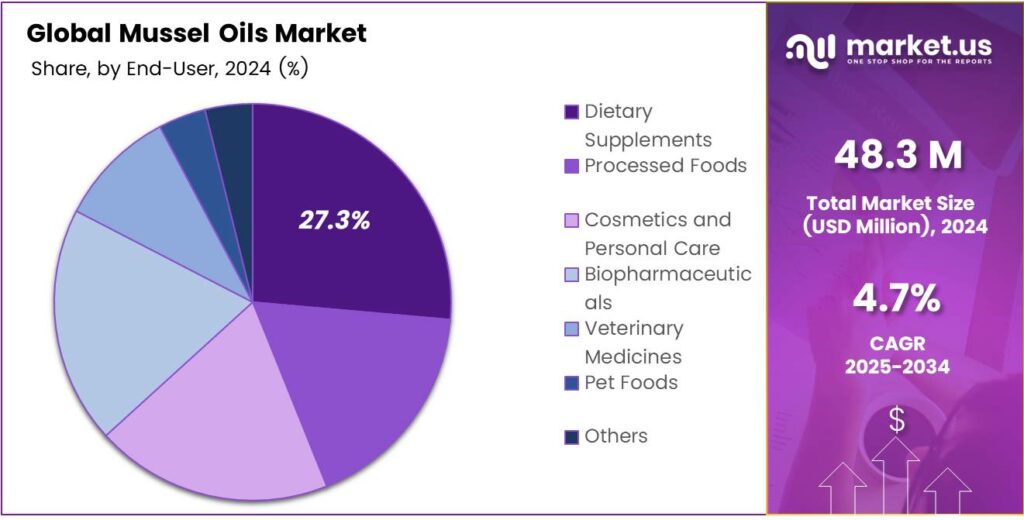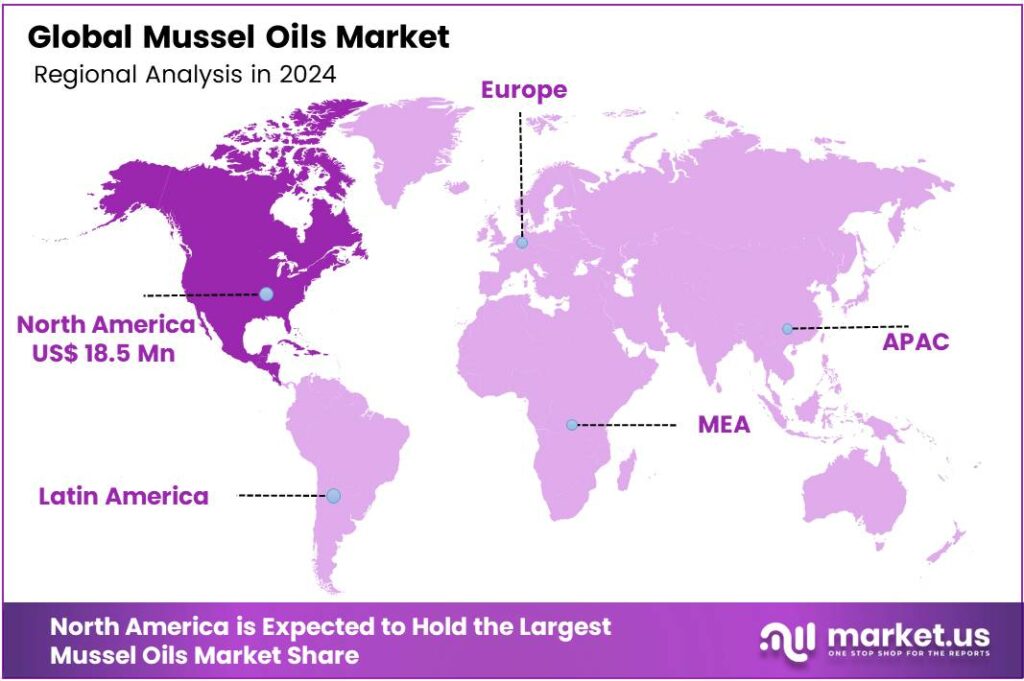Global Mussel Oils Market Size, Share, And Business Benefits By Grade (Food Grade, Cosmetic Grade, Pharmaceutical Grade), By Distribution Channel (Supermarkets, Wholesale, Online Retailers, Specialty Stores, Others), By End Use (Dietary Supplements, Processed Foods, Cosmetics and Personal Care, Biopharmaceuticals, Veterinary Medicines, Pet Foods, Others), By Region and Companies - Industry Segment Outlook, Market Assessment, Competition Scenario, Trends, and Forecast 2025-2034
- Published date: August 2025
- Report ID: 156505
- Number of Pages: 267
- Format:
-
keyboard_arrow_up
Quick Navigation
Report Overview
The Global Mussel Oil Market size is expected to be worth around USD 76.5 million by 2034, from USD 48.3 million in 2024, growing at a CAGR of 4.7% during the forecast period from 2025 to 2034.
The Mussel Oils Market is positioned as a niche yet steadily expanding segment within the nutraceutical and functional food industry. Mussel oil, derived primarily from green-lipped mussels, is valued for its high concentration of omega-3 fatty acids, antioxidants, and bioactive compounds that support joint, cardiovascular, and cognitive health.

The n-3 polyunsaturated fatty acid (PUFA) content was similar in MO (51.01%) and FO (46.82%), primarily consisting of C22:6n-3 and C20:5n-3. Wild-type mice, fed a normal diet and given CO, served as healthy controls (CON). Serum levels of IL-1β, NF-κB, and VCAM-1 were comparable between the MO and FO groups but significantly lower than in the CO group.
Aortic protein levels of p65NF-κB, p38MAPK, and VCAM-1 were significantly reduced in the MO group compared to the CO group, with p-p65NF-κB and p-p38MAPK levels also considerably lower than in the FO group. Atherosclerotic plaques in the aorta were analyzed by placing the aorta in PBS solution (0.01 M, pH 7.2–7.4), removing perivascular fat under a stereoscopic microscope, fixing with 4% paraformaldehyde, and longitudinally sectioning for Oil-red O staining.
Serial cryosections (8–10 μm) from the aortic sinus and arch were prepared for histological analysis. Lipids from treatment oils and the phospholipid (PL) fraction of erythrocyte membranes were mixed with toluene and 0.9 mol/L H2SO4/methanol (1:3, v/v). Fatty acid methyl esters were generated by incubating at 70°C for 120 minutes, extracted with n-hexane, and purified using a Sep-Pak silica column. The solution was dried under N2, redissolved in n-hexane, and analyzed by gas chromatography (GC) with an Agilent DB-23 column (60 m, 0.25 mm × 0.25 μm).
Key Takeaways
- The Global Mussel Oils Market is projected to grow from USD 48.3 million in 2024 to USD 76.5 million by 2034, at a CAGR of 4.7%.
- Food-grade mussel oils dominated in 2024, holding a 48.2% market share due to demand for natural, nutrient-rich oils in food and supplements.
- Supermarkets led distribution channels in 2024, capturing a 31.4% market share, driven by consumer trust in physical retail for health products.
- Dietary Supplements held a 27.3% market share in 2024, fueled by demand for mussel oil’s omega-3 and anti-inflammatory benefits.
- North America led the global market in 2024 with a 38.5% share, generating USD 18.5 million, supported by strong consumer awareness and retail infrastructure.
Analyst Viewpoint
Consumers are increasingly drawn to mussel oil for its natural, sustainable profile and benefits like joint health and inflammation reduction. Millennials and aging populations are key demographics, seeking preventive healthcare solutions. The rise in e-commerce has made mussel oil more accessible, with online platforms driving sales.
Advancements like supercritical CO2 extraction are enhancing mussel oil’s quality and yield, making it more appealing to manufacturers and consumers. These technologies improve lipid recovery while maintaining omega-3 stability, but their high costs can limit adoption. Innovations in processing, such as micronization, are also improving product solubility and consumer acceptance, supporting premium pricing strategies.
The regulatory landscape emphasizes sustainability and product safety, particularly in Europe, where strong frameworks ensure high-quality standards. North America also enforces strict guidelines on health claims and labeling. Companies must adopt eco-friendly practices, like responsible mussel harvesting, to comply and build consumer trust, aligning with global demand for sustainable products.
By Grade
Food Grade Mussel Oils Lead with 48.2% Market Share
In 2024, Food Grade held a dominant market position, capturing more than a 48.2% share of the global mussel oils market. This dominance reflects the growing demand for natural, nutrient-rich oils in food and dietary supplements, where consumers are increasingly choosing clean-label and marine-sourced ingredients.
With mussel oil known for its rich omega-3 profile and anti-inflammatory properties, its adoption in functional foods, beverages, and capsules has accelerated, particularly in health-conscious regions like North America and Europe. This segment is expected to strengthen further as more food manufacturers incorporate mussel oil into fortified products and wellness formulations.
The rising popularity of preventive healthcare, alongside the preference for sustainable marine ingredients, ensures that food-grade mussel oils will remain the preferred choice for both producers and consumers. The ability of this segment to combine nutritional benefits with safety and quality standards positions it as the backbone of the mussel oils market’s expansion in the coming years.
By Distribution Channel
Supermarkets Drive Sales with 31.4% Share in 2024
In 2024, Supermarkets held a dominant market position, capturing more than a 31.4% share of the global mussel oils market. The strong presence of this channel is linked to consumer trust in large retail stores, where buyers prefer to physically examine and compare health and nutrition products before making a purchase.
Supermarkets have increasingly expanded their health and wellness sections, offering mussel oil in capsule, liquid, and functional food formats, which has boosted accessibility for a wider consumer base. Supermarkets are expected to retain their leading role as rising disposable incomes and urban lifestyles encourage shoppers to choose convenient, one-stop locations for dietary supplements and natural wellness products.
Promotional campaigns, product visibility on shelves, and collaborations with trusted health brands will further strengthen their hold. As consumer interest in marine-sourced omega-3 supplements grows, supermarkets remain a critical driver of volume sales, reinforcing their importance in shaping the retail dynamics of mussel oils worldwide.
By End Use
Dietary Supplements Lead with 27.3% Share in 2024
In 2024, Dietary Supplements held a dominant market position, capturing more than a 27.3% share of the global mussel oils market. This leadership comes from the strong demand for natural joint health and anti-inflammatory solutions, as mussel oil is widely recognized for its omega-3 and bioactive compounds that support overall wellness.
Consumers increasingly view dietary supplements as a convenient way to integrate mussel oil into their daily routines, particularly in capsule and softgel formats that fit modern lifestyles. The dietary supplements segment is expected to see steady growth as more individuals turn to preventive healthcare and natural alternatives over synthetic products.
The rising prevalence of arthritis, cardiovascular concerns, and lifestyle-related health issues is further driving supplement intake across key markets such as North America, Europe, and Asia-Pacific. With its proven benefits and strong consumer trust, the dietary supplements segment will continue to anchor the demand for mussel oils, ensuring it remains a core driver of market expansion in the years ahead.

Key Market Segments
By Grade
- Food Grade
- Cosmetic Grade
- Pharmaceutical Grade
By Distribution Channel
- Supermarkets
- Wholesale
- Online Retailers
- Specialty Stores
- Others
By End Use
- Dietary Supplements
- Processed Foods
- Cosmetics and Personal Care
- Biopharmaceuticals
- Veterinary Medicines
- Pet Foods
- Others
Drivers
Anti-Inflammatory Omega-3 Benefits from Mussel Oil
One of the primary drivers of the mussel oil market is its rich supply of omega-3 fatty acids, specifically EPA and DHA, which are widely recognized for their powerful anti-inflammatory effects and health-supportive properties. The U.S. National Institutes of Health (NIH) emphasizes that EPA and DHA are particularly important because our bodies rely on dietary sources for these fats; they cannot produce enough internally.
Clinical insights add real weight to a 2023 meta‑analysis that found that omega‑3 supplementation, which includes EPA and DHA, effectively relieves arthritis pain and improves joint function in osteoarthritis patients, with no increase in adverse events. Even more compelling, a focused study on green-lipped mussel oil revealed remarkable effects: an 89% decrease in VAS (Visual Analogue Scale) pain scores and 91% of patients reporting improved quality of life compared to those taking fish oil.
Restraints
Climate-Driven Production Collapse
In 2024, warm seas devastated mussel farms in its Aegean region. The harvest collapsed by a staggering 90%, and even the seed stock for the following year was wiped out, meaning the loss wasn’t just temporary, but potentially long‑term.
This isn’t an isolated case. In Galicia, Spain, Europe’s top mussel-producing region, the industry has witnessed catastrophic declines, plunging to its lowest production levels in 25 years. Mussel output fell from 250,000 tonnes to 178,000 tonnes.
From a government standpoint, responses vary from emergency grants to research funding. But tackling climate disruption at its root requires broader, systemic policies, strong climate action, and ecosystem-based solutions. Without those, production remains hostage to nature’s swings.
Opportunity
Rapid Scale-Up in Mussel Aquaculture
One of the most compelling growth drivers behind the mussel oils market is the dramatic expansion of mussel farming in key producing regions. Chile stands out in particular. At the turn of the century, Chile’s mussel farms produced just 25,000 tonnes.
Fast-forward to 2023, and that figure has shot up to 388,000 tonnes, a staggering increase that reflects growing global appetite and confidence in sustainable aquaculture practices. On a global level, aquaculture overtook capture fisheries in total aquatic animal production for the first time in history.
In 2024, worldwide aquaculture output reached a record 130.9 million tonnes, compared to 92.3 million tonnes from wild catch. This shift underscores a broader trend: people and governments are looking to aquaculture, especially shellfish farming, as the sustainable, scalable answer to feeding more people while protecting marine ecosystems.
Trends
Ecosystem Restoration Driving Mussel Oil Potential
One major emerging driver for the mussel oils market is the growing attention toward mussel ecosystem restoration, not just for environmental reasons, but also for the long-term benefits it brings to supply and sustainability. A notable example comes from the Mussels for Clean Water Initiative (MuCWI) in the United States.
Under this program, restoration efforts are scaled to the level where a healthy mussel bed can filter more than 10 gallons of water per mussel per day, a powerful sign of how crucial these creatures are for clean and thriving aquatic systems.
Ecosystem restoration isn’t just an environmental good; it’s an emerging strategic lever for mussel oil’s future. Stronger mussel populations mean better quality oil, weatherproofed supply, and deeper value for consumers and investors alike.
Regional Analysis
North America Dominates with 38.5%, USD 18.5 Million Market Share
In 2024, North America held a commanding lead in the global mussel oils market, accounting for 38.5% of the total share, equivalent to USD 18.5 million in revenue. This preeminent position reflects strong consumer awareness around omega-3 supplements and a mature retail infrastructure that supports both offline and online distribution channels.
One of the key factors behind this regional dominance is the solid standing of dietary supplements within the broader health and wellness ecosystem. The U.S., in particular, continues to see rising interest in natural, marine-based omega-3 sources for joint, heart, and overall health.
Statistics from the U.S. National Institutes of Health (NIH) indicate that over 50% of adults regularly use dietary supplements, underscoring a ripe environment for products like mussel oil. At the same time, e-commerce in North America accounted for over 20% of total retail sales in 2023, making online platforms increasingly vital for consumer access and convenience.
Government support, while not always explicitly targeted at mussel oil, has been pivotal in supporting aquaculture research and sustainability practices, especially through funding for marine science and aquaculture in U.S. and Canadian coastal communities. These efforts help ensure a stable raw material supply, a crucial component for scaling production and building investor confidence.

Key Regions and Countries
- North America
- US
- Canada
- Europe
- Germany
- France
- The UK
- Spain
- Italy
- Rest of Europe
- Asia Pacific
- China
- Japan
- South Korea
- India
- Australia
- Rest of APAC
- Latin America
- Brazil
- Mexico
- Rest of Latin America
- Middle East & Africa
- GCC
- South Africa
- Rest of MEA
Key Players Analysis
Waitaki Bio, a key player in the mussel oils market, Waitaki Bio specializes in sustainable, high-grade green-lipped mussel oil. Sourced from pristine New Zealand waters, their products are renowned for exceptional purity and high concentrations of Omega-3s (EPA/DHA) and unique ETA. They focus on advanced lipid extraction to preserve bioactive compounds, targeting the premium nutraceutical and cosmeceutical sectors.
Aroma NZ Ltd is a significant supplier of high-quality green-lipped mussel oil, leveraging its location in New Zealand. The company emphasizes cold-processing techniques to ensure the oil’s natural integrity and potency are maintained, preserving its anti-inflammatory properties. Their product is marketed for supporting joint health and overall wellness.
Nature’s Range is a recognized brand offering green-lipped mussel oil capsules directly to consumers. They differentiate themselves by providing a highly concentrated, pure oil supplement promoted for its benefits in reducing joint discomfort and improving mobility. Their strategy focuses on accessibility and consumer education through online platforms and retail partnerships.
Top Key Players in the Market
- Waitaki Bio
- Aroma NZ Ltd
- Nature’s Range
- Great HealthWorks
- Blackmores
- BioMer Limited
- Lovely Health Ltd.
- MOXXOR LLC
- Henry Blooms Health Products
- Xtend-Life
Recent Developments
- In 2024, Waitaki Biosciences continues to emphasize sustainable sourcing from New Zealand’s pristine waters, with a purpose-built manufacturing facility utilizing advanced technology like supercritical fluid extraction for high-purity mussel oil production.
- In 2024, Aroma NZ has advanced its supercritical fluid extraction process, using CO2 to produce high-purity green-lipped mussel oil with potent anti-inflammatory properties. In 2025, they highlighted this technology for extracting bright orange mussel oil, effective in small doses for joint care supplements.
Report Scope
Report Features Description Market Value (2024) USD 48.3 Million Forecast Revenue (2034) USD 76.5 Million CAGR (2025-2034) 4.7% Base Year for Estimation 2024 Historic Period 2020-2023 Forecast Period 2025-2034 Report Coverage Revenue Forecast, Market Dynamics, Competitive Landscape, Recent Developments Segments Covered By Grade (Food Grade, Cosmetic Grade, Pharmaceutical Grade), By Distribution Channel (Supermarkets, Wholesale, Online Retailers, Specialty Stores, Others), By End Use (Dietary Supplements, Processed Foods, Cosmetics and Personal Care, Biopharmaceuticals, Veterinary Medicines, Pet Foods, Others) Regional Analysis North America – US, Canada; Europe – Germany, France, The UK, Spain, Italy, Rest of Europe; Asia Pacific – China, Japan, South Korea, India, Australia, Singapore, Rest of APAC; Latin America – Brazil, Mexico, Rest of Latin America; Middle East & Africa – GCC, South Africa, Rest of MEA Competitive Landscape Waitaki Bio, Aroma NZ Ltd, Nature’s Range, Great HealthWorks, Blackmores, BioMer Limited, Lovely Health Ltd., MOXXOR LLC, Henry Blooms Health Products, Xtend-Life Customization Scope Customization for segments, region/country-level will be provided. Moreover, additional customization can be done based on the requirements. Purchase Options We have three licenses to opt for: Single User License, Multi-User License (Up to 5 Users), Corporate Use License (Unlimited Users and Printable PDF) 
-
-
- Waitaki Bio
- Aroma NZ Ltd
- Nature's Range
- Great HealthWorks
- Blackmores
- BioMer Limited
- Lovely Health Ltd.
- MOXXOR LLC
- Henry Blooms Health Products
- Xtend-Life










